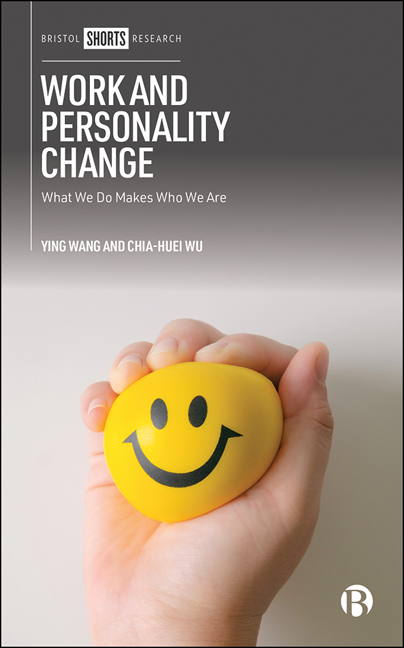Book contents
- Frontmatter
- Contents
- List of Figures
- Notes on Authors
- Preface
- one What Personality Is and Why It Matters for Organisations
- two Can Personality Traits Change, and How? A Review of Personality Development Literature
- three How Work Experiences Drive Personality Change: The Impact of Work, Organisational, Societal and International Environment
- four Intentional Personality Change: Individual Agency in Change and Interventions for Change
- five Implications of Personality Change at Work for Research and Practice
- References
- Index
one - What Personality Is and Why It Matters for Organisations
Published online by Cambridge University Press: 04 January 2022
- Frontmatter
- Contents
- List of Figures
- Notes on Authors
- Preface
- one What Personality Is and Why It Matters for Organisations
- two Can Personality Traits Change, and How? A Review of Personality Development Literature
- three How Work Experiences Drive Personality Change: The Impact of Work, Organisational, Societal and International Environment
- four Intentional Personality Change: Individual Agency in Change and Interventions for Change
- five Implications of Personality Change at Work for Research and Practice
- References
- Index
Summary
As individuals we all have unique characteristics that make us different from one another, and personality forms one of these important characteristics. Because of our personality differences, we tend to have different ways of thinking, feeling, behaving and relating to others and approaching the world. More importantly, personality has important implications in our lives – it impacts our social and interpersonal relationships, academic and work performance, mental health and well-being and even our physical health and longevity.
However, this is not to say that we should adopt a deterministic perspective about personality or a pessimistic belief that our lives will turn out in certain ways because of how our personality is engineered. As we will describe later, despite having relative stability, personality is not fixed, and instead can be changed by a vast range of life events and experiences. The authors’ particular interest rests on how such change occurs in the work and vocational domain – a domain that is of critical importance to us due to the substantial amount of time we spend in this domain during our lives. By drawing on a wealth of the latest research evidence in personality psychology and organisational psychology, we intend to present how and why such change can happen and what we can do to facilitate this change in a positive and meaningful way.
This first chapter is a foundational chapter in which we provide a brief review of how personality is conceptualised, as well as how personality has been studied (and the results of those studies applied) in the work context. This chapter is intentionally kept very brief so that we can quickly move onto the change perspective of personality in the remaining chapters.
What is personality?
Personality as a concept has attracted broad interest for thousands of years. As early as the fourth century BC, Greek physicians proposed four temperamental types that differentiate individuals from one another – the sanguine, choleric, melancholic and phlegmatic – primarily based on individuals’ bodily fluids (i.e. ‘humours’). Since the development of psychology as a scientific discipline, personality has taken a central position in the discipline for the purpose of understanding individual differences, with numerous perspectives and discussions undertaken throughout the 20th century.
- Type
- Chapter
- Information
- Work and Personality ChangeWhat We Do Makes Who We Are, pp. 1 - 12Publisher: Bristol University PressPrint publication year: 2021

